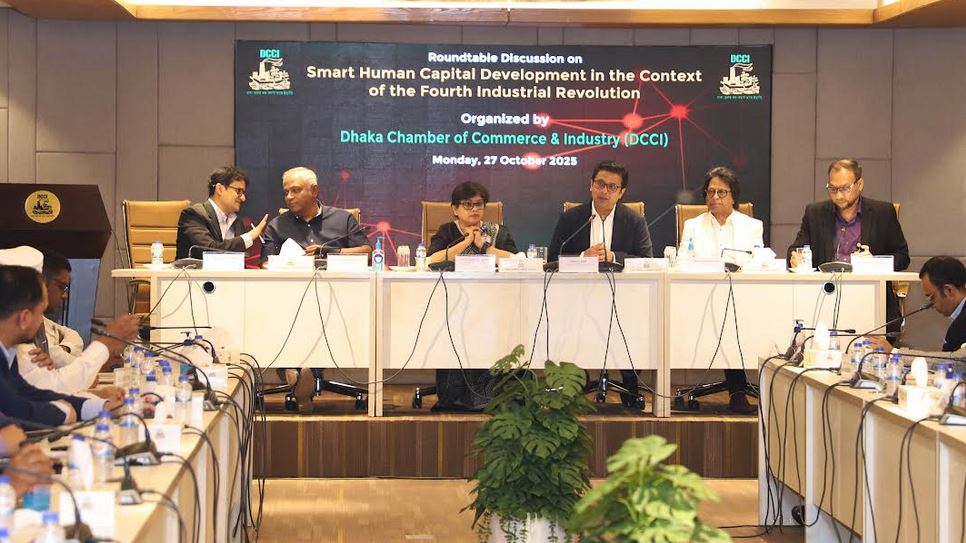News Flash

DHAKA, Oct 27, 2025 (BSS) - Speakers at a roundtable discussion today said
that Bangladesh should put greater emphasis on developing skilled human
resources in order to cope with the rapidly changing economic activities
driven by evolving information and technology.
They said there is also a need for modernization of the country's overall
education system, expansion of technical and vocational education programmes,
ensuring adequate budgetary allocation, providing necessary training to meet
the challenges of the Fourth Industrial Revolution (4IR), strengthening
coordination among relevant government agencies and fostering stronger
industry-academia collaboration.
Speakers highlighted these issues at a roundtable discussion titled "Smart
Human Capital Development in the Context of the Fourth Industrial Revolution
(4IR)" held today at the DCCI Auditorium in the capital.
Executive Chairman of National Skills Development Authority (NSDA) Dr.
Nazneen Kawshar Chowdhury graced the occasion as the chief guest.
Dr. Nazneen Kawshar Chowdhury highlighted that there is a lack of
coordination among government agencies involved in conducting training
programmes, as well as the limited awareness regarding the importance of
skills development.
During its initial phase, NSDA primarily focused on establishing its legal,
physical and administrative structures, she said, adding, "However, the
organization now is focusing on training for human resource development."
In addition, she informed that initiatives have been undertaken to teach the
Japanese language with government and academic support to send 100,000
skilled workers to Japan.
Besides, Nazneen stressed the need for training programmes to upskill the
women population. The NSDA Executive Chairman also suggested integrating
skill development with the Fourth Industrial Revolution while enhancing
public-private collaboration.
In his welcome remarks, DCCI President Taskeen Ahmed said the Fourth
Industrial Revolution is not just limited to technological transition rather
it led the world toward a profound transformation in production systems,
business operations and labor markets.
He remarked that artificial intelligence (AI) is reshaping the country's
industrial and service sectors.
Citing the World Economic Forum, he mentioned that nearly one-fourth of
current jobs will be transformed over the course of next five years. He
stressed that in the post-LDC era, smart human resources will be a key
instrument to remain competitive. "We must prepare ourselves for technology-
driven employment opportunities."
The Dhaka Chamber President also stated that to tackle this evolving reality,
Bangladesh must bring fundamental reforms in its education system, focus more
on technical education and strengthen industry-academia linkage.
In his keynote presentation, Dr. M Niaz Asadullah, visiting Professor of
Economics, Reading University in the United Kingdom (UK) stressed the need to
enhance workers' technological skills through rigorous training.
He also called for modernization of the education system, wider use of
advanced technologies in technical education and ensuring budget allocation
for implementing skill development programmes.
Mahtab Uddin Ahmed, president of The Institute of Cost and Management
Accountants of Bangladesh (ICMAB), underscored the importance of promoting
technical education and changing the societal mindset towards vocational
training.
Prof Dr. Shams Rahman, Vice Chancellor (VC) of East West University (EWU),
Mohammed Saiful Hassan, joint secretary of ICT Division, Bangladesh Hi-Tech
Park Authority, Raisul Kabir, chief executive officer (CEO) of Brain Station
23, Dr. Muhammad Masroor Ali, Prof of Computer Science and Engineering (CSE)
Department, BUET, Khan Muhammad Saqiful Alam, FCILT, regional senior manager
of Data & Analytics [Asia Pacific, Middle East and Africa] of British
American Tobacco, M. Shabbir Ali, corporate head of human resource (HR) of
Transcom Group, spoke at the event.
In the open floor discussion, DCCI former Vice-President M. Abu Hurairah
emphasized on sending skilled manpower abroad to boost inward remittance flow
and called for expansion of technical education programmes.
The DCCI Director Zamsher Ali, Convenor of the DCCI Standing Committee Mir
Sharukh Islam also spoke at the session.
DCCI Senior Vice President Razeev H Chowdhury, its Vice President Md. Salem
Sulaiman, members of the Board of Directors and other stakeholders were also
present at the event.